PRINCETON, NJ -- As the Dow Jones average plunged more than 400 points last week, consumers pulled back, with self-reported spending falling 24% from the prior week and 27% from the same week a year ago. This breaks the positive early January trend that saw spending running slightly higher than last year's comparables. At the same time, economic confidence was about the same as the prior week and Gallup's Job Creation Index showed that hiring remained essentially unchanged.
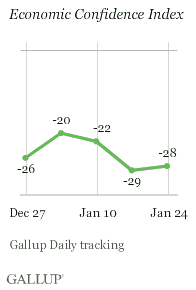
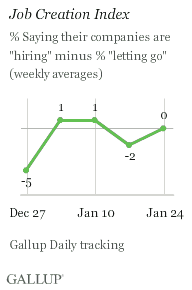
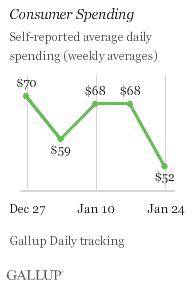
What Happened (Week Ending Jan. 24)
-
Consumer Spending plummeted last week to the lowest weekly average Gallup has found since it began measuring consumer spending in January 2008. Self-reported daily spending in stores, restaurants, gas stations, and online averaged $52 -- down 24% from the prior week and down 27% from the same week a year ago. This marks the first time in 2010 that a full week's spending has failed to match its year-ago comparable. It now seems likely that January 2010 spending may simply match the January 2009 average of $64 per day -- reflecting a continuation of what turned out to be something of a "new normal" in spending for most of last year.
-
Economic Confidence was essentially unchanged last week, as Gallup's Economic Confidence Index was at -28 -- virtually the same as the -29 of the prior week. Thirty-six percent of Americans said the economy is "getting better" while 58% said it is "getting worse." At the same time, 45% rated the economy "poor" and 11% rated it "excellent" or "good." Economic confidence is currently slightly worse than it was on average during December 2009 and much more positive than it was a year ago.
-
Job Creation as reflected by U.S. workers' reports of their own employers' hiring/firing activities improved slightly last week, as Gallup's Job Creation Index was at 0, compared to -2 the prior week. Still, hiring remains weak, with 24% of employees reporting their companies are hiring -- essentially the same as the prior week (23%) and a year ago (24%). As has been the case during recent months, the slight improvement from last week as well as the more pronounced improvement from a year ago is the result of fewer workers (24%) saying their companies are letting people go. Right now, job-market conditions are no different than they were on average during December 2009 (24% hiring and 24% letting go).
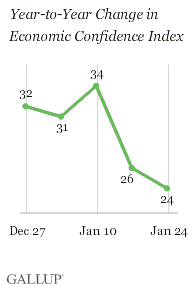
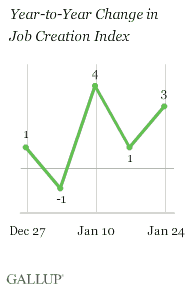
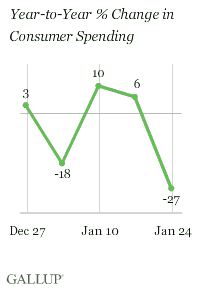
What to Watch For
Gallup's economic data provide little positive news as the president prepares for his State of the Union address and the FOMC meets this week. Last week's self-reported consumer spending results are somewhat troubling. A modest decline was to be expected because last week was a non-paycheck week, but the extent of the drop fully offset the slight spending gains recorded earlier this month, relative to last year's comparables. While this could be a one-week event related to the plunge in the stock market or something else, it merits careful monitoring in the days ahead. Regardless, right now consumers don't seem to be in the mood to spend more than last year's reduced -- new normal -- levels.
Similarly, there is not a lot to celebrate on the jobs front. Improvements have taken place as fewer companies seem to be letting people go, but hiring is no better than it was at this time last year. Last Thursday's jobless claims report showed a sharp upward spike, probably owing to holiday distortions of the data. Regardless, Gallup's data have continually suggested that jobless claims are running higher than previously reported by the government. Gallup's data also imply that the January unemployment rate will exceed December's 10.0%.
Gallup's Economic Confidence Index improved in early January 2010 compared to December but has fallen back to last month's level during recent weeks. Still, the average of Gallup's Index during January suggests that the Reuters/University of Michigan Consumer Sentiment Index for the month of January is likely to show a slight increase compared to December.
The president and the FOMC can tout the fact that things are much better now than they were during the depths of the financial crisis -- Wall Street has surged and the government on Friday is likely to report a second consecutive quarter of economic growth. Still, they must also recognize that Americans continue to experience double-digit unemployment and there are few signs that job-market conditions will improve in the near term. Further, many small businesses that may have been holding on in hope that the economy will improve are likely to be reaching the end of their ability to survive, particularly if consumer spending continues to languish.
As a result, it should not be surprising if the president and Congress become more populist in tone, as is likely to be reflected in the State of the Union address. Nor should the FOMC expect to see the political pressure diminish even if Fed Chairman Ben Bernanke is confirmed later this week, as expected. Of course, the danger is that the increasingly populist political climate will not be conducive to what needs to be done to create new private-sector jobs and stimulate consumer spending in 2010. Right now, consumers and business need Washington to create increased economic certainty as opposed to increased government and regulatory risk.
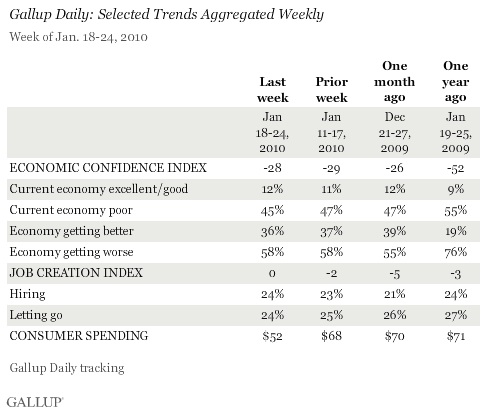
Review and export the complete daily trends on these measures: Economic Indexes; Consumer Spending; Economic Outlook; Economic Conditions; Job Market
Learn more about Gallup's economic measures.
On Feb. 23, 2010, at its world headquarters in Washington, D.C., Gallup for the first time will release the findings from its daily U.S. employment tracking, including insights into the U.S. workforce's state of mind. Learn more ...
Survey Methods
For Gallup Daily tracking, Gallup interviews approximately 1,000 national adults, aged 18 and older, each day. The Gallup consumer perceptions of the economy and consumer spending results are based on random half-samples of approximately 500 national adults, aged 18 and older, each day. The Gallup job creation and job loss results are based on a random half sample of approximately 500 current full- and part-time employees each day. Results from the week of Jan. 18-24, 2010, are based on telephone interviews with 3,430 adults for the consumer perceptions and spending questions. For these results, one can say with 95% confidence that the maximum margin of sampling error is ±3 percentage points. Results for the job creation and job loss questions are based on interviews with 4,036 employees, with a maximum margin of error of ±3 percentage points.
Interviews are conducted with respondents on land-line telephones and cellular phones.
In addition to sampling error, question wording and practical difficulties in conducting surveys can introduce error or bias into the findings of public opinion polls.
